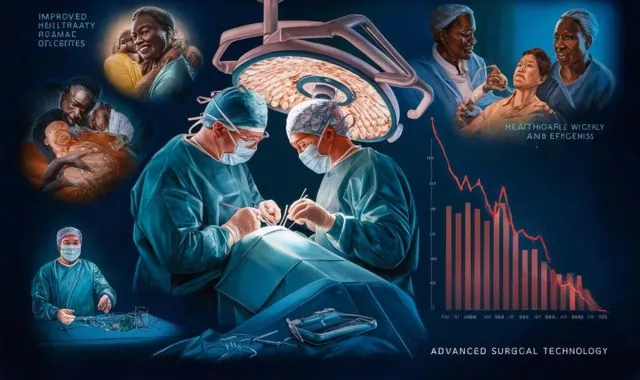Physical Address
304 North Cardinal St.
Dorchester Center, MA 02124
Physical Address
304 North Cardinal St.
Dorchester Center, MA 02124

Surgical technology is revolutionizing medicine with minimally invasive techniques, AI assistance, and VR training. Surgical techs orchestrate the operating room using advanced tools and their own expertise, making a crucial difference in patient care. This exciting field offers a rewarding career path for those passionate about the future of surgery.

Surgery has long been a cornerstone of medicine, a field where precision and innovation meet to heal. But the surgeon’s scalpel is no longer the only cutting-edge tool in the operating room. Today, surgical technology is undergoing a remarkable transformation, with advancements that are shaping the future of medicine.
Surgical technology is a field that encompasses the specialized equipment, devices, and procedures used during surgery. It goes beyond the tools themselves, extending to the skilled professionals who operate them – the surgical techs.
Surgical technology has a rich history. Early tools were crude, but innovation has driven progress. From the ancient Egyptians using sharpened flint to medieval surgeons wielding rudimentary instruments, the quest for better tools has been constant. The 19th century saw breakthroughs like anesthesia and antiseptics, revolutionizing surgery. Today, advancements mirror science fiction, with techniques like robotic surgery and 3D printing pushing the boundaries of what’s possible.
Surgical technologists, often referred to as surgical techs, are the backbone of the operating room. They work alongside surgeons, assisting with everything from preparing the sterile field to ensuring the smooth flow of instruments during surgery. Their expertise in surgical procedures and equipment is vital to a successful operation.
The modern surgical suite is a marvel of technology. Let’s explore some of the most exciting advancements:
Laparoscopy, a minimally invasive surgical technique using small incisions and cameras, has transformed countless procedures. Robotic surgery takes this a step further, allowing surgeons to operate with enhanced precision and control through robotic arms. These techniques offer patients faster recovery times and less scarring.
Surgeons can now see inside the body with unparalleled clarity thanks to advanced imaging technologies. Techniques like CT scans and MRIs provide detailed 3D views of anatomy, while real-time imaging during surgery allows for even greater precision.
Sutures and staples are getting an upgrade. New biocompatible materials and innovative closure techniques are minimizing scarring and promoting faster healing. Tissue sealants are also emerging, offering a non-invasive way to close wounds.

The integration of technology is fundamentally changing surgery:
Artificial intelligence (AI) is poised to become a game-changer. AI systems can analyze patient data to predict potential complications, recommend treatment options, and even assist surgeons during operations. Imagine an AI that can identify the most effective surgical approach or warn of potential risks in real-time.
Genetic analysis and other advancements are paving the way for precision medicine, where surgeries can be tailored to a patient’s unique biology. This personalized approach can lead to more effective and targeted interventions.
Virtual reality (VR) is revolutionizing surgical training. VR simulations allow surgeons to practice complex procedures in a safe, realistic environment. This immersive training fosters better spatial awareness and prepares surgeons for the most challenging cases.
While technology plays an increasingly vital role, the human element remains irreplaceable in surgical technology:
Surgical techs need not only technical expertise but also strong communication and teamwork skills. Operating rooms are high-pressure environments, and clear communication between surgeons, techs, and anesthesia staff is essential for a successful outcome.
If you’re passionate about medicine and making a difference, a career in surgical technology could be for you. Surgical techs play a vital role in ensuring positive patient outcomes. The field offers opportunities for growth, with specializations like surgical first assist and a constant influx of new technologies to master.

The future of surgical technology is bright. As technology and human expertise continue to work in tandem, we can expect even more groundbreaking advancements. Imagine a world where surgeries are performed with unparalleled precision, tailored to individual needs, and offer minimal invasiveness and faster recovery. This future is closer than ever, thanks to the dedication of surgical technologists and the relentless pursuit of innovation in this exciting field.
Typically, an associate’s degree in surgical technology is required. These programs combine classroom learning with clinical rotations in operating rooms.
Strong attention to detail, excellent manual dexterity, the ability to work effectively under pressure, and good communication and teamwork skills are all crucial.
Absolutely! The field offers competitive salaries, job security, and the opportunity to make a real difference in patients’ lives. With advancements in technology, the demand for skilled surgical techs is expected to grow.
Surgical techs can specialize in different areas like cardiac, neurological, or orthopedic surgery. They can also pursue leadership roles or focus on areas like sterile processing.
Surgical assistants have more advanced training and can perform some tasks under the direct supervision of a surgeon, while surgical techs primarily focus on preparing the operating room and assisting with instruments.